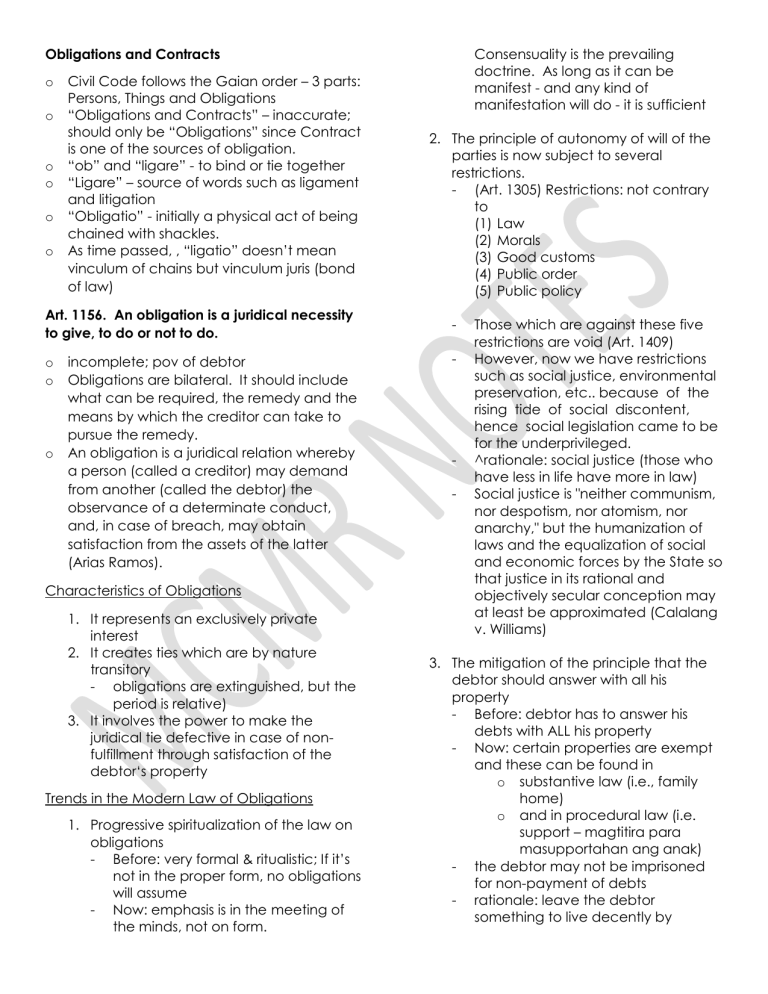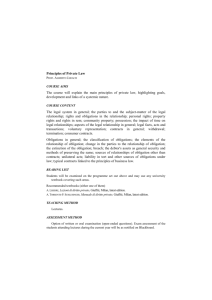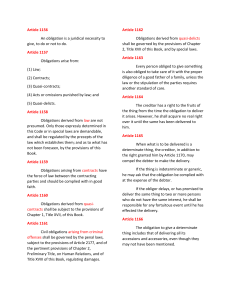
Obligations and Contracts o o o o o o Civil Code follows the Gaian order – 3 parts: Persons, Things and Obligations “Obligations and Contracts” – inaccurate; should only be “Obligations” since Contract is one of the sources of obligation. “ob” and “ligare” - to bind or tie together “Ligare” – source of words such as ligament and litigation “Obligatio” - initially a physical act of being chained with shackles. As time passed, , “ligatio” doesn’t mean vinculum of chains but vinculum juris (bond of law) Art. 1156. An obligation is a juridical necessity to give, to do or not to do. o o o incomplete; pov of debtor Obligations are bilateral. It should include what can be required, the remedy and the means by which the creditor can take to pursue the remedy. An obligation is a juridical relation whereby a person (called a creditor) may demand from another (called the debtor) the observance of a determinate conduct, and, in case of breach, may obtain satisfaction from the assets of the latter (Arias Ramos). Characteristics of Obligations 1. It represents an exclusively private interest 2. It creates ties which are by nature transitory - obligations are extinguished, but the period is relative) 3. It involves the power to make the juridical tie defective in case of nonfulfillment through satisfaction of the debtor‘s property Trends in the Modern Law of Obligations 1. Progressive spiritualization of the law on obligations - Before: very formal & ritualistic; If it’s not in the proper form, no obligations will assume - Now: emphasis is in the meeting of the minds, not on form. Consensuality is the prevailing doctrine. As long as it can be manifest - and any kind of manifestation will do - it is sufficient 2. The principle of autonomy of will of the parties is now subject to several restrictions. - (Art. 1305) Restrictions: not contrary to (1) Law (2) Morals (3) Good customs (4) Public order (5) Public policy - - Those which are against these five restrictions are void (Art. 1409) However, now we have restrictions such as social justice, environmental preservation, etc.. because of the rising tide of social discontent, hence social legislation came to be for the underprivileged. ^rationale: social justice (those who have less in life have more in law) Social justice is "neither communism, nor despotism, nor atomism, nor anarchy," but the humanization of laws and the equalization of social and economic forces by the State so that justice in its rational and objectively secular conception may at least be approximated (Calalang v. Williams) 3. The mitigation of the principle that the debtor should answer with all his property - Before: debtor has to answer his debts with ALL his property - Now: certain properties are exempt and these can be found in o substantive law (i.e., family home) o and in procedural law (i.e. support – magtitira para masupportahan ang anak) - the debtor may not be imprisoned for non-payment of debts - rationale: leave the debtor something to live decently by 4. The weakening of the principle that liability arises from responsibility - basically the principle in quasi-delicts - a person may be held liable even if not responsible - i.e. minor is responsible – guardian is liable Requisites of the Object of the obligation a. Licit – Example: Can‘t validly enter into a contract for sexual services b. Possible both in fact and in law – physical and legal possibility c. Determinate or determinable d. Must have pecuniary value 5. The tendency of unity in modern legislation - can be manifest in the rise of a “global village” - seen particularly in trade laws - tendency is to make things uniform especially in commerce. Different rules would impede commerce. 4. Vinculum juris (Juridical tie) - consists of the enforceability of the obligation - If the debtor does not conform, the creditor has the power to go to court to make the debtor perform (coercive force) - Voluntariness goes into entering into an obligation. But once you enter, it becomes involuntary. Essential Requisites of Obligations 1. Active subject - to give: creditor - to do: obligee 2. Passive subject - to give: debtor - to do: obligor 5. Causa - causa debendi or causa obligationes - the why of an obligation 6. Form (not an essential requisite) - general rule: no specific form for a valid obligation. - if form means that there is some external manifestation, fine. However, there should still be no specific form. How can both subjects be determinate or determinable? a) Obligations where the subjects are completely and absolutely determined at the birth of an obligation. b) Obligations where one subject is determined at the moment of the birth of the obligation and the other subject is to be determined subsequently at some fixed criterion, which criterion is fixed at the start of the obligation. (i.e. promissory note endorsement) c) Obligations in which subjects are determined in accordance with its relation to a thing. (i.e. mortgage attached to a purchased property can be demandable from the new owner) 3. Object/Prestation - always consists in an activity or conduct to be observed by the debtor towards the creditor - prestation = object of obligation – to deliver car - car = object of the prestation Sources of Obligations Art. 1157. Obligations arise from: (1) Law; (2) Contracts; (3) Quasi-contracts; (4) Acts or omissions punished by law; and (5) Quasi-delicts. Is this exclusive? AFFIRMATIVE (Sagrada Orden v. NACOCO) However, this is only by implication or indication. Many believe that the list is not exclusive one more possible source - public offer. 1. Law Art. 1158. Obligations derived from law are not presumed. Only those expressly determined in this Code or in special laws are demandable, and shall be regulated by the precepts of the law which - There is only 1 ultimate source of obligations – law 2. Contract Art. 1159. Obligations arising from contracts have the force of law between the contracting parties and should be complied with in good faith. - combines two concepts of Roman law equity or good faith and strict compliance by the parties - A contract is a meeting of minds between 2 persons whereby one binds himself, with respect to the other, to give something or to render some service (Art. 1305) - The contracting parties may establish such stipulations, clauses, terms and conditions as they may deem convenient, provided they are not contrary to law, morals, good customs, public order, or public policy (Art. 1306) - Contracts are perfected by mere consent, and from that moment the parties are bound not only to the fulfillment of what has been expressly stipulated but also to all the consequences which, according to their nature, may be in keeping with good faith, usage and law (Art. 1315) - In case of doubt, the interpretation consistent with good faith is followed - Party cannot excuse themselves on the ground that it has become unprofitable 3. Quasi-contract Art. 1160. Obligations derived from quasicontracts shall be subject to the provisions of Chapter 1, Title XVII, of this Book. - Juridical relation which arises from lawful, voluntary, and unilateral acts which are enforceable to the end that no one shall be unjustly enriched or benefited at the expense of another. a. Negotiorum Gestio - Whoever voluntarily takes charge of the agency or management of the business or property of another, without any power from the latter, is obliged to continue the same until the termination of the affair and its incidents, or to require the person concerned to substitute him, if the - - - owner is in a position to do so. (Art. 2144) Requisites: (1) Business/property must be neglected or abandoned (2) Officious manager must not have been authorized by the owner Obligation to reimburse belong to the owner of the property It is not necessary that some benefit has been given. There may be no actual benefit. As long as benefit could have possibly accrued Rules: (1) There must be no ratification. Otherwise, it may fall under the contract of agency o If there was no ratification, the owner must reimburse the inofficious of the useful and necessary expenses as well as the damages he suffered in discharge of his functions b. Solutio Indebiti - Juridical relation which takes place when somebody receives something from another without any right to demand for it and the thing was unduly delivered to him through mistake - Not applicable when there is a motivation by an act of liberality - Does mistake include mistake of law? If payment by mistake includes it, we are deviating from provisions of art. 3 (ignorance of the law excuses no one of compliance therewith.) No one can ever claim a mistake of law as a defense. - Payment by a mistake in interpretation of a difficult question of law qualifies as a mistake that can justify an act of recovery of what have been paid under the principle of solutio indebiti. - (Art. 2155) Payment by reason of a mistake in the construction or application of a doubtful or difficult question of law may come within the scope of the preceding article. 4. Delict Art. 1161. Civil obligations arising from criminal offenses shall be governed by the penal laws, subject to the provisions of article 2177, and of the pertinent provisions of Chapter 2, Preliminary Title, on Human Relations, and of Title XVIII of this Book, regulating damages. - General Rule: If you commit a crime, you are liable both criminally and civilly. - Exception: No private offended party (i.e. contempt) 5. Quasi-delict Art. 1162. Obligations derived from quasidelicts shall be governed by the provisions of Chapter 2, Title XVII of this Book, and by special laws. - Art. 2176. Whoever by act or omission causes damage to another, there being fault or negligence, is obliged to pay for the damage done. Such fault or negligence, if there is no pre-existing contractual relation between the parties, is called a quasi-delict. - Requisites: (1) There is fault or negligence of the defendant resulting to a wrongful act or omission, whether voluntary or not, whether criminal or not. (2) There is damage or injury suffered by another (3) There is a direct causa relation between the fault or negligence and the resulting damage and injury (proximate cause) - a civil law term while tort is a common law term - Difference between Contractual Liability and Quasi-Delict o QD: the obligation arises only when there is a violation. Without violation, there is no obligation. It is the breach itself which gives rise to the obligation. o Contracts: there is already an obligation which exists prior to or even without a breach. The breach of the contract is immaterial to the legal obligation. - Breach and quasi-delict are inseparable. But contract and breach may be separable. - Are contracts and quasi-delicts mutually exclusive? NO Kinds of Obligations 1. To give (Articles 1163-1166) a. To give a determinate thing - Primary Obligation: Giving what is supposed to be given - 3 Accessory Obligations: (1) to take care of it with the proper diligence of a good father of the family (Art. 1163) o General Rule: Diligence of a good father of the family o Exception: Law or stipulation requires different standard of care (2) To account and deliver to the creditor the fruits if the thing bears fruits upon the time the obligation to deliver it arises (Art. 1164) (3) To deliver the accessions and accessories (Art. 1166) o Don‘t take accession in the technical sense. Understand it to mean things that go with the thing to be delivered (i.e. car radio) - Remedies Available to the Creditor o Specific performance - the debtor must perform it personally o Equivalent performance – damages (may be obtained exclusively or in addition to other remedies)



